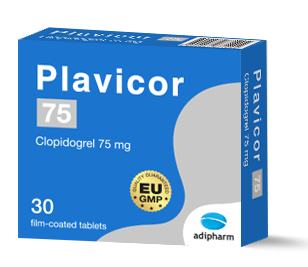Plavicor contains clopidogrel and belongs to a group of medicines called antiplatelet medicinal products. Platelets are very small structural elements of the blood which clump together during blood clotting. By preventing this clumping, antiplatelet medicinal products reduce the chances.
PDF with product descriptionPlavicor has been prescribed for you to prevent blood clots and reduce the risk of these severe events because you have:
• a condition of hardening of arteries (also known as atherosclerosis), and
• previously experienced a heart attack, stroke or have a condition known as peripheral arterial disease, or
• experienced a severe type of chest pain known as “unstable angina” or “myocardial infarction” (heart attack). For the treatment of this condition your doctor may have placed a stent in the blocked or narrowed artery to restore effective blood flow. You should also be given acetylsalicylic acid (a substance present in many medicines used to relieve pain and lower fever as well as to prevent blood clotting) by your doctor.
• an irregular heartbeat, a condition called “atrial fibrillation”, and you cannot take medicines known as “oral anticoagulants”(vitamin K antagonists) which prevent new clots from forming and prevent existing clots from growing. You should know that oral anticoagulants are more effective than acetylsalicylic acid or the combined use of Plavicor and acetylsalicylic acid for this condition. Your doctor should prescribe Plavicor plus acetylsalicylic acid if you cannot take oral anticoagulants and if there is no risk of massive bleeding for you.
Always take this medicine exactly as your doctor has told you. Check with your doctor or pharmacist if you are not sure.
The recommended dose, including for patients with a condition called “atrial fibrillation” (an irregular heartbeat), is one 75 mg tablet of Plavicor daily to be taken orally with or without food, at the same time each day.
If you have experienced a severe chest pain (unstable angina or heart attack), your doctor may prescribe you 300 mg Plavicor (4 tablets of 75 mg) as a single dose at the start of treatment. Afterwards, the usual dose is one 75 mg tablet Plavicor daily taken orally with or without food, at the same time each day.
You should take Plavicor for as long as your doctor has prescribed it.



